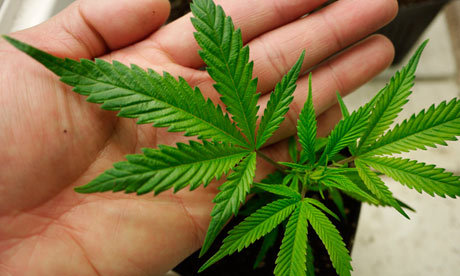Uruguay has taken a momentous step towards becoming the first country in the world to create a legal, national market for cannabis after the lower chamber of its Congress voted in favour of the groundbreaking plan.
The Bill would allow consumers to either grow up to six plants at home or buy up to 40g per month of the soft drug – produced by the government – from licensed chemists for recreational or medical use. Previously, although possession of small amounts for personal consumption was not criminalised in the small South American nation, growing and selling it was against the law.
The Bill passed by 50 votes to 46 shortly before midnight on Wednesday after a 14-hour debate as pro-legalisation activists crowded the balconies above the legislature floor.
Uruguay’s Senate, where the ruling left-wing coalition has a larger majority, is now expected to approve the measure. President José Mujica, an octogenarian former armed rebel – who has previously overseen the passing of measures to allow abortion and gay marriage – backs the move.
Proponents of the Bill argue marijuana use is already prevalent in Uruguay and that by bringing consumers out of the shadows the government will be better able to regulate their behaviour, drive a wedge between them and peddlers of harder, more dangerous drugs, and tax cannabis sales.
They also believe that it closes the loophole that outlaws growing or buying cannabis while turning a legal blind eye to its consumption. Currently, judges in Uruguay have discretion to decide whether an undefined small quantity of the drug is for personal use or not.
Campaigners for an end to prohibition were quick to claim the vote as a landmark in the international push for drug policy reform. “Sometimes small countries do great things,” said Ethan Nadelmann, executive director of the New York-based Drug Policy Alliance, whose board includes entrepreneur Richard Branson, but also the late President Ronald Reagan’s former Secretary of State, George Shultz.
“Uruguay’s bold move does more than follow in the footsteps of Colorado and Washington,” added Mr Nadelmann, referring to the two Western US states that recently also permitted recreational cannabis use. “It provides a model for legally regulating marijuana that other countries, and US states, will want to consider.”
Hannah Hetzer, the Drug Policy Alliance’s Americas coordinator, who is based in Montevideo, added: “At the heart of the Uruguayan marijuana regulation Bill is a focus on improving public health and public safety. Instead of closing their eyes to the problem of drug abuse and drug trafficking, Uruguay is taking an important step towards responsible regulation of an existing reality.”
Nevertheless, the measure has divided Uruguay and in the run-up to the vote few dared predict its outcome, with the 99-member house almost split down the middle. All 49 opposition deputies had agreed to vote against the measure en bloc, while the 50 members of President Mujica’s ruling coalition were due to back it.
One of the government deputies, Darío Pérez, a doctor by training, had warned that cannabis is a gateway drug to harder substances and feared that fully legalising it would trigger a mushrooming of Uruguay’s already serious problems with crack and other cheaper, highly addictive cocaine derivatives.
In the most keenly awaited speech of the debate, Mr Pérez attacked the Bill but said he would vote in line with the coalition whip, although he could not have made his displeasure clearer. “Marijuana is manure,” he told the chamber. “With or without this law, it is the enemy of the student and of the worker.”
Mr Pérez was also unhappy with what he saw as a broken promise by Mr Mujica not to foist the law on a society that was not yet ready for it, citing a recent survey by pollsters Cifra that found 63 per cent of Uruguayans opposed cannabis legalisation while 23 per cent backed it.
Last December, the president had temporarily placed the measure on the back burner to give advocates a chance to rally public opinion. “The majority has to come in the streets,” he said then. “The people need to understand that with bullets and baton blows, putting people in jail, the only thing we are doing is gifting a market to the narco-traffickers.”
But those arguments failed to convince Gerardo Amarilla, a deputy for the conservative opposition National Party, who told the chamber: “We are playing with fire. Maybe we think that this is a way to change reality. Unfortunately, we are discovering a worse reality.”
Official studies from Uruguay’s National Drugs Board have found that of the country’s population of 3.4 million, around 184,000 people have smoked cannabis in the last year. Of that number, 18,400 are daily consumers. But independent researchers believe that may be a serious underestimate. The Association of Cannabis Studies has claimed there are 200,000 regular users in Uruguay.
One thing that no one disputes is that Uruguay has a serious and growing problem with harder drugs, principally cocaine and its highly addictive derivatives flooding into the Southern Cone and Brazil, mainly from Peru and Bolivia. That, in turn, has fuelled a crime wave as addicts seek to fund their cravings. Breaking the link between them and cannabis users is one of the government’s principal justifications for marijuana legalisation.
Under the measure, registered users will be able to buy cannabis from the nation’s chemists, cultivate plants at home and form cannabis clubs of 15 to 45 members to collectively grow up to 99 plants. Although the high would depend on the strength of the cannabis, which can vary significantly, the 40g per month limit would allow a user to potentially smoke several joints every day. To prevent cannabis tourism, such as that which has developed in Amsterdam, only Uruguayan nationals will be able to register as cannabis purchasers or growers.
Uruguay’s move comes as pressure grows across Latin America for a new approach to Washington’s “war on drugs”, which has ravaged the region, seeing hundreds of thousands die in drug-fuelled conflicts from Brazil’s favelas to Mexico’s troubled border cities.
Colombia President Juan Manuel Santos has called for a discussion of the alternatives while his Guatemalan counterpart Otto Pérez Molina has openly advocated legalisation. Meanwhile, Felipe Calderón, President of Mexico from 2006 to 2012, has also called for a look at “market” solutions to the drug trade.
Crucially, all three are conservatives with impeccable records as tough opponents of the drug trade. Mr Pérez Molina is a former army general with a no-nonsense reputation, while Mr Santos served as Defence Minister for his predecessor, the hard-right President Álvaro Uribe. Meanwhile, Mr Calderón was widely criticised during his time in power for the bloodbath unleashed by his full-frontal assault on the drug cartels, a conflict which cost an estimated 60,000 lives during his presidency.







